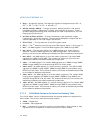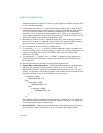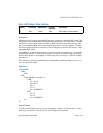
3-12 Vol. 2A
INSTRUCTION SET REFERENCE, A-M
See Appendix C, “InteL® C/C++ Compiler Intrinsics and Functional Equivalents,” in
the Intel® 64 and IA-32 Architectures Software Developer’s Manual, Volume 2B, for
more information on using intrinsics.
Intrinsics API
The benefit of coding with MMX technology intrinsics and the SSE/SSE2/SSE3 intrin-
sics is that you can use the syntax of C function calls and C variables instead of hard-
ware registers. This frees you from managing registers and programming assembly.
Further, the compiler optimizes the instruction scheduling so that your executable
runs faster. For each computational and data manipulation instruction in the new
instruction set, there is a corresponding C intrinsic that implements it directly. The
intrinsics allow you to specify the underlying implementation (instruction selection)
of an algorithm yet leave instruction scheduling and register allocation to the
compiler.
MMX
™
Technology Intrinsics
The MMX technology intrinsics are based on a __m64 data type that represents the
specific contents of an MMX technology register. You can specify values in bytes,
short integers, 32-bit values, or a 64-bit object. The __m64 data type, however, is
not a basic ANSI C data type, and therefore you must observe the following usage
restrictions:
• Use __m64 data only on the left-hand side of an assignment, as a return value,
or as a parameter. You cannot use it with other arithmetic expressions (“+”, “>>”,
and so on).
• Use __m64 objects in aggregates, such as unions to access the byte elements
and structures; the address of an __m64 object may be taken.
• Use __m64 data only with the MMX technology intrinsics described in this manual
and Intel
®
C/C++ compiler documentation.
• See:
— http://www.intel.com/support/performancetools/
— Appendix C, “InteL® C/C++ Compiler Intrinsics and Functional Equivalents,”
in the Intel® 64 and IA-32 Architectures Software Developer’s Manual,
Volume 2B, for more information on using intrinsics.
— SSE/SSE2/SSE3 Intrinsics
— SSE/SSE2/SSE3 intrinsics all make use of the XMM registers of the Pentium
III, Pentium 4, and Intel Xeon processors. There are three data types
supported by these intrinsics: __m128, __m128d, and __m128i.
• The __m128 data type is used to represent the contents of an XMM register used
by an SSE intrinsic. This is either four packed single-precision floating-point
values or a scalar single-precision floating-point value.
• The __m128d data type holds two packed double-precision floating-point values
or a scalar double-precision floating-point value.


















